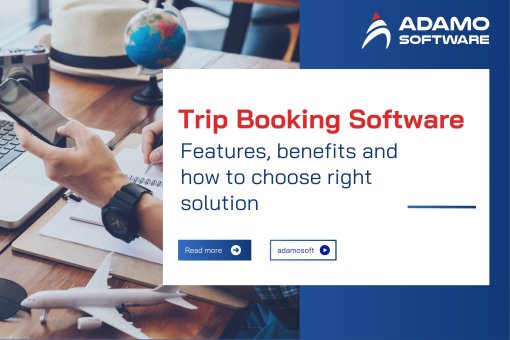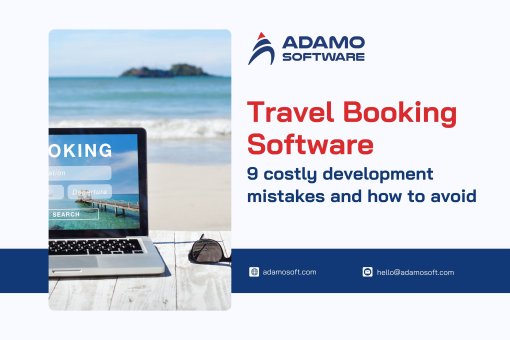Flight Ticket Booking App Development Cost: Factors to Consider
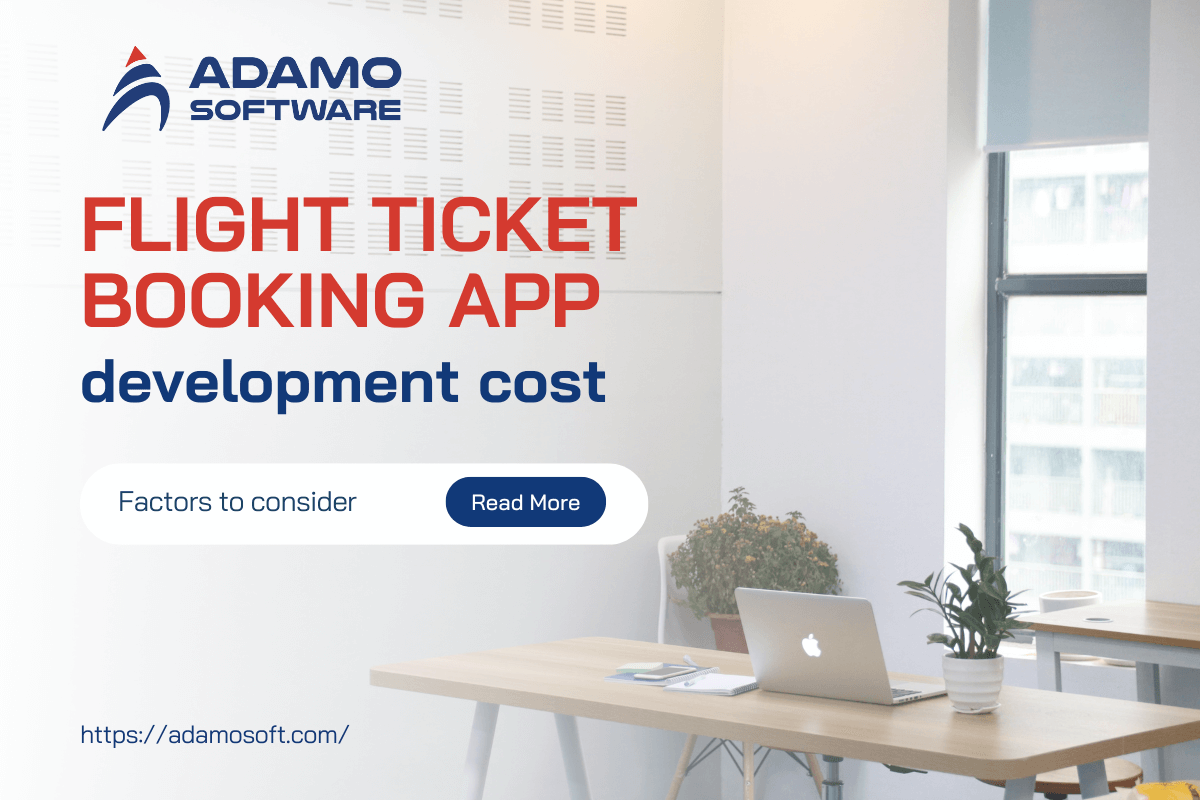
Flight ticket booking app is experiencing a surge in popularity within the tourism industry. The market size of this industry is expected to witness a Compound Annual Growth Rate (CAGR) of 9.0% from 2022 to 2030. These apps offer users a seamless travel experience and help them efficiently manage their travel processes.
The trend of booking tickets online is gaining momentum due to the increasing use of mobile devices. This shift has eliminated the need for third-party tools and has reduced overall costs for travelers. IT firms are also benefiting from the development of flight ticket booking app, as it presents new opportunities for growth.
In this article, we will explore the factors that affect the cost of flight booking app development. We will also provide an extensive list of features for flight ticket booking app development and discuss various monetization strategies that can be implemented to generate revenue from these apps.
Before delving into the cost-affecting factors, let’s first understand why a flight booking engine is crucial for travel businesses, especially airlines and Online Travel Agencies (OTAs).
I. Flight booking engine: Why it becomes matter
In today’s digital landscape, businesses in the travel sector must adapt to meet the evolving demands of their clients and stay competitive. This necessitates the adoption of reliable and efficient flight booking software.
Let’s explore the key reasons why enterprises consider investing in a flight ticket booking app:
1. Optimized time and resource
A flight ticket booking app enables travel businesses to optimize their time and resources. As they can reduce the manual effort required for ticket reservations, they will save time and manpower. And they can focus more on other important tasks, such as providing better customer service or expanding their business.
For example, instead of manually handling ticket bookings over the phone or through physical ticket counters, a flight ticket booking app allows customers to make their bookings online, reducing the need for extensive manual intervention.
2. Augmented operational efficiency
The automation of various processes, such as ticket reservations, cancellations, and modifications, streamlines operations and eliminates potential errors that may occur during manual handling.
Picture this: When a customer books a flight ticket through a booking engine, the system automatically updates the availability of seats in real-time, preventing overbooking and ensuring a smooth and efficient booking experience.
3. Real-time data availability
Flight booking app also provides access to real-time data, allowing travel businesses to make informed decisions and respond promptly to market changes. By analyzing data on flight bookings, customer preferences, and market trends, businesses can optimize their operations, pricing strategies, and marketing campaigns.
4. Enhanced customer experience
A flight ticket booking app helps empower customers to easily search for flights, compare prices, select preferred seats, and make bookings at their convenience. This convenience and flexibility enhance customer satisfaction and loyalty.
Passengers can quickly search for flights based on their preferred dates, destinations, and budget. Flight booking engine provides detailed information about flight options, including schedules, prices, and available amenities, enabling customers to make well-informed decisions.
5. Cost-effectiveness
Cost is the factor every business owner must care about. By automating the booking process, businesses can reduce the need for manual labor, paperwork, and physical infrastructure, which can lead to significant cost savings in the long run.
Instead of employing a large team to handle ticket reservations and manage physical ticket counters, a flight booking engine can handle a high volume of bookings with minimal human intervention, reducing labor costs.
6. Customization and personalization
A proficient flight ticket booking app offers the flexibility to customize and personalize the booking process according to the specific needs and preferences of customers. This enhances the overall user experience and fosters customer loyalty.
As flight booking engine can allow customers to save their preferred travel preferences, such as seat preferences, meal choices, and frequent flyer information, this information can be used to personalize future booking experiences, providing customers with a more tailored and convenient service.
7. Facilitated business expansion
A flight booking engine serves as a catalyst for business expansion. So that businesses can attract more customers and expand their customer base. This allows them to explore new markets and tap into untapped opportunities.
II. Key components of flight ticket booking app
A flight ticket booking app can greatly enhance user experience and speed up the booking process. With its various features, such as advanced search options, real-time flight schedules and alerts, and secure payment gateways, users can easily find the best flight options, stay informed about any changes or disruptions, and make secure transactions.
This app can also offer customer and admin features, as well as advanced functionalities like multilingual support, in-app chat, AI integration, virtual reality tours, and social media integration.
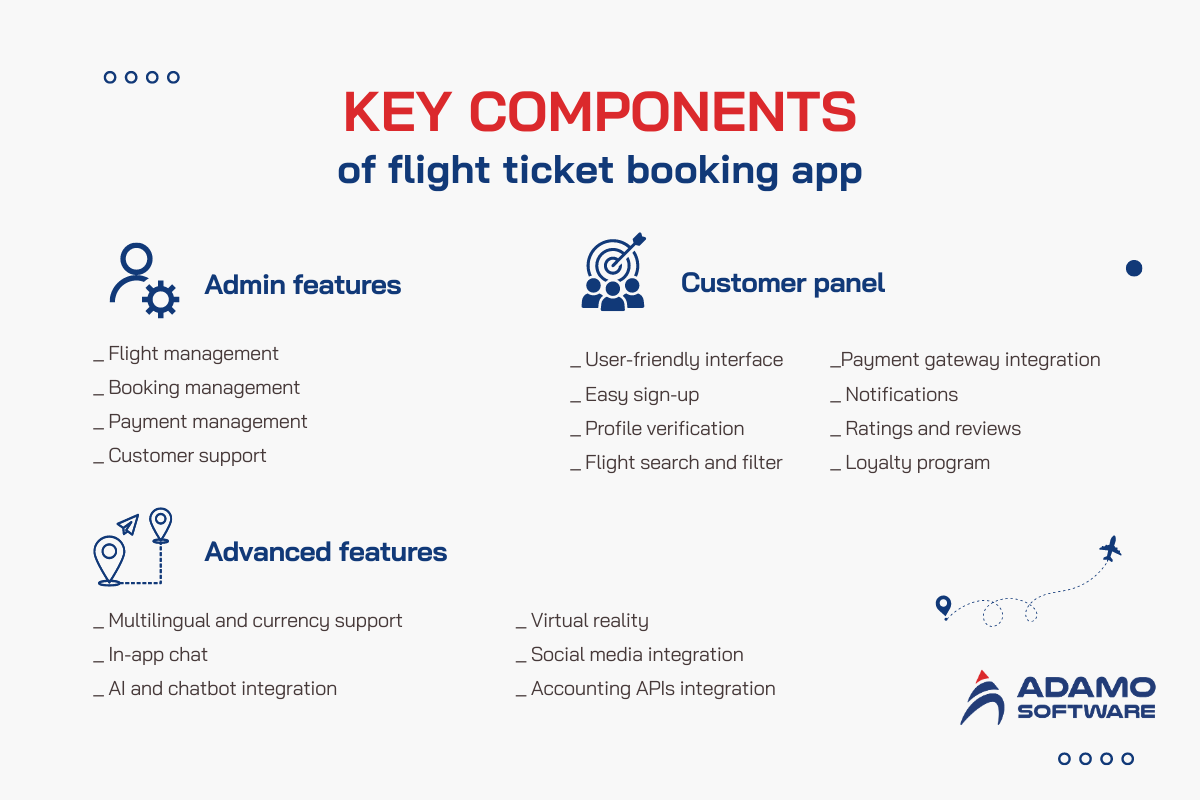
1. Admin features
_ Flight management: Admins should be able to control flight data, including timetables, availability, and costs within flight ticket booking app.
_ Booking management: Admins also need to have control over user reservations, cancellations, and refunds.
_ Payment management: Payment management is a necessary feature as it affects revenue of a travel business. Admins should be able to manage payments, including commissions and refunds.
_ Customer support: This app should provide admin access to phone, email, and chat support options.
2. Customer panel
_ User-friendly interface: Flight booking app should have a simple and user-friendly interface that allows users to easily search for and book flights.
_ Easy sign-up: Users should be able to sign up for the app using their official email or contact number. Social media sign-up options can also be provided in some cases.
_ Profile verification: After registration, customers should be able to verify their credentials through a security pin sent to their email or phone number.
_ Flight search and filter: This app should also provide search options, including destination, date, and price range, to help customers find the best flight options.
_Payment gateway integration: To help passengers easily pay for their purchase with various payments methods, flight ticket booking app needs to have a secure and reliable payment gateway to facilitate transactions.
_ Notifications: The app should send notifications to customers when there are changes in their flight status, gate changes, or departure/arrival delays.
_ Ratings and reviews: Users should be able to check reviews related to multiple airlines, accommodations, and more to make informed travel decisions.
_ Loyalty program: Flight ticket booking app can include a loyalty program that offers discounts, freebies, or other benefits to loyal users.
3. Advanced features
_ Multilingual and currency support: The app should support multiple languages and currencies to cater to customers from different countries and regions.
_ In-app chat: It should also have an in-app chat feature that allows users to communicate with customer service agents.
_ AI and chatbot integration: AI technology can be used to find the best flight deals and provide personalized vacation suggestions.
_ Virtual reality: The app can provide virtual reality tours of airports and airplane cabins, offering an immersive user experience.
_ Social media integration: Passengers should be able to share their travel plans and experiences on social media platforms directly from the app.
_ Accounting APIs integration: Integrating accounting APIs can help admins easily track their overall finances.
Gain more insights on What is Flight API? Use for Travel Itinerary Making Platforms
III. Factors that influence the cost to create a flight ticket booking app
1. Your desired UI/UX design
A well-defined UI/UX strategy is a crucial factor that determines the success of a flight ticket booking app. A seamless app design can enhance user engagement and customer retention. To ensure this, the development team conducts multiple testing procedures.
The overall cost of building a flight booking app varies depending on the number of testing tools used and the number of quality assurance iterations carried out to ensure proper app functioning.
Factors that affect the cost of UI/UX design include:
_ UI optimization
_ Visual elements
_ Typography
_ Color psychology
_ Content writing
_ Button placements
_ Branding
_ Portrait mode
2. Specific underlying platform
The choice of app development platform significantly impacts the budget. The budgetary requirements vary for iOS, Android, and cross-platform apps. Starting with a single platform is recommended initially to optimize the budget. Once the app gains traction in the market, switching to a cross-platform app is advisable. This can help minimize budgetary requirements and maximize the app’s reach.
3. Team size of software development company
The team size for building a flight booking app has a significant impact on the development cost. While hiring freelancers may reduce costs, the quality of the software may be compromised due to their lack of professional expertise. Alternatively, outsourcing the project to a dedicated software development agency can optimize costs while leveraging their years of expertise.
The minimum team requirements for flight ticket booking app development typically include:
_ 1-2 project managers
_ 2-3 frontend developers
_ 2-3 backend developers
_ 1-2 business analysts
_ 1-2 UX/UI designers
_ 1-2 quality assurance analysts
4. Location of the software development partner
The location of the software development agency directly affects the cost of building a flight ticket booking app. Hourly rates for development in areas like Asia countries such as Vietnam, Indonesia is generally lower compared to the US and Europe. The estimated hourly rates can vary across different parts of the world.
Country/region | Development rate per hour |
Vietnam | $20-$45 |
Asia | $25-$50 |
US | $95-$100 |
| Australia | $70-$90 |
Eastern Europe | $50-$55 |
Westen Europe | $80-$90 |
5. Flight ticket booking app maintenance
It is important to take necessary actions to ensure that the app runs seamlessly across all platforms and offers optimal performance. However, be aware that maintenance costs may arise at the end of the development process. These costs include charges required for app upgrades or implementing new technologies as per market requirements.
6. Demanded features
When developing a custom flight booking app, analyzing the feature list that will be integrated into the app is crucial as it directly affects the overall cost. A well-defined set of features for a flight booking app is essential to differentiate the app from competitors and gain traction in the market. Carefully considering the necessary features and prioritizing them accordingly will ensure the app’s success.
7. Tech stack involved
Incorporating modern technologies is vital to make your app stand out from competitors in the travel industry. A robust tech stack, supported by a dedicated flight booking app, is essential to gain traction in the market. But you should remember that the cost of integrating these technologies can vary based on the required time frame for implementation.
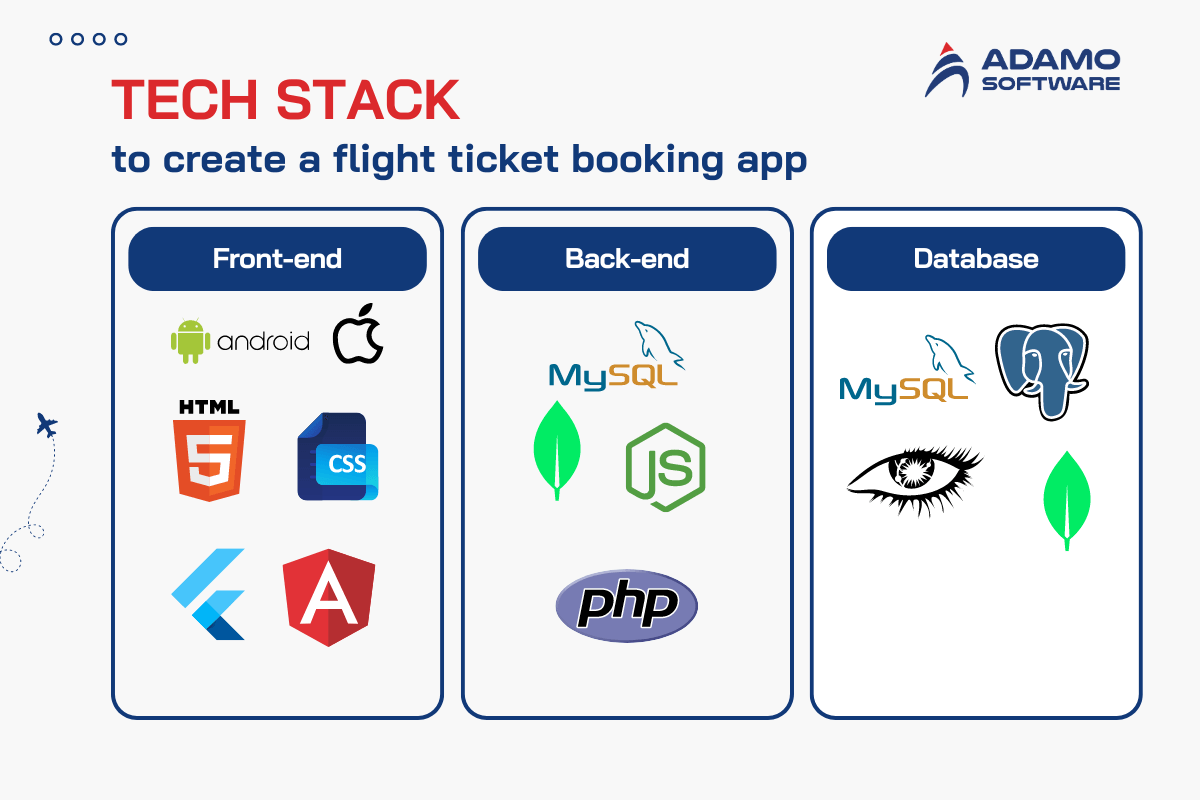
IV. Flight booking app development cost: breaking the cost of development
Developing a flight booking app involves several cost factors that need to be considered. Let’s break them down:
1. Complexity of the app
The complexity of the app plays a significant role in determining the cost. A basic flight booking app may cost between $50,000 to $100,000, while a more complex app with advanced features can cost around $250,000.
2. Development team costs
This includes expenses related to hiring developers, designers, and project managers. The team size may vary depending on the scope of the project. A typical team includes project managers, business analysts, frontend and backend developers, designers, and quality assurance analysts.
3. Additional costs
Apart from development, there are other costs to consider, such as server hosting, third-party integrations, and app store fees. These expenses contribute to the overall cost of app development.
4. Other expenses
Consider other expenses associated with the development process, including marketing/advertising costs, legal fees, insurance, and ongoing maintenance and support.
V. Strategies to reduce development costs
To reduce the cost of developing a flight booking app, businesses can consider the following strategies:
1. Outsourcing development
Hiring a third-party mobile app development company can be cost-effective compared to building an in-house team. Outsourcing eliminates the need to pay salaries, benefits, and overhead costs associated with maintaining an in-house team.
2. Pre-built templated and modules
Utilizing pre-built templates and modules can save time and effort during the development process. These ready-made components can reduce the overall development cost while maintaining quality.
3. Outsourcing vs In-house development cost
Deciding between outsourcing and in-house development is a critical factor that can impact app development costs.
_ Outsourcing: Outsourcing app development is generally more cost-effective as it eliminates the need to hire and manage an in-house team. It can provide access to a broader range of skills and expertise, and the development company can handle the entire process.
_ In-house Development: Hiring an in-house team gives you more control over the development process and provides personalized support. However, it might be more expensive due to the costs associated with salaries, benefits, infrastructure, and ongoing maintenance.
VI. Choose the right software development company: Significance and Costs to build
If you decide to hire a software development company to outsource your flight ticket booking development, remember that the total time required to build a travel app is around 1000 hours.
And, the average cost of travel app development is approximately $50 to $100/hour.
So, the estimated cost of a flight booking app can range from $50,000 to $100,000.
Parameters | Cost |
Per hour | $50 to $100 |
| Total cost | $50,000 to $100,000 |
VII. Why selects Adamo as a trust flight ticket booking app development company
The cost of developing a custom flight ticket booking app is influenced by various factors, including the inclusion of distinct features that aim to simplify users’ lives. To get an accurate estimation of the cost, it is recommended to outline your app idea and consult with a mobile app development company that has a similar portfolio. This will ensure the best possible outcome and a more precise cost estimation for your project.
At Adamo Software, we are a premier software development company specializing in travel and hospitality solutions. One of our core strengths lies in providing lucrative and innovative software solutions tailored to the specific needs of our clients in the travel industry. Our expertise allows us to develop cutting-edge technology that enhances efficiency and delivers a seamless user experience at a reasonable cost.
If you are looking to develop a flight ticket booking app with our feature-rich booking engine solutions, please do not hesitate to contact us.






